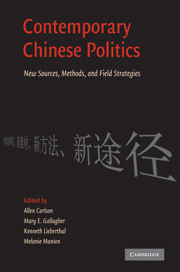Book contents
- Frontmatter
- Contents
- Tables and Figures
- Contributors
- Abbreviations
- Introduction
- Part I Sources
- 1 State-Generated Data and Contentious Politics in China
- 2 Why Archives?
- 3 The Central Committee, Past and Present
- 4 Experimental Methods and Psychological Measures in the Study of Chinese Foreign Policy
- 5 Internet Resources and the Study of Chinese Foreign Relations
- 6 Information Overload?
- Part II Qualitative Methods
- Part III Survey Methods
- Reflections on the Evolution of the China Field in Political Science
- Glossary
- References
- Index
1 - State-Generated Data and Contentious Politics in China
Published online by Cambridge University Press: 05 June 2012
- Frontmatter
- Contents
- Tables and Figures
- Contributors
- Abbreviations
- Introduction
- Part I Sources
- 1 State-Generated Data and Contentious Politics in China
- 2 Why Archives?
- 3 The Central Committee, Past and Present
- 4 Experimental Methods and Psychological Measures in the Study of Chinese Foreign Policy
- 5 Internet Resources and the Study of Chinese Foreign Relations
- 6 Information Overload?
- Part II Qualitative Methods
- Part III Survey Methods
- Reflections on the Evolution of the China Field in Political Science
- Glossary
- References
- Index
Summary
China specialists in the reform era are blessed with much better accessibility to data than previous generations (Perry, 1994b: 704–713). In particular, much information that was collected and maintained by governmental agencies has now become available to researchers. However, because of scholars’ unfamiliarity with such sources, uncertainty about collecting them, and long-existing skepticism of their reliability, so far very few scholars have taken full advantage of this opportunity.
In China, many topics on state-society relations are regarded as “sensitive” by the government. Consequently, researchers are faced with various restrictions on their empirical inquiries. Those who study popular contention often find themselves in a difficult situation: interviews or surveys are difficult to arrange, and little information can be found in the media. Under such circumstances, governmental materials, if available, often provide the best sources for the study of state-society interactions. After all, for a long time the party-state not only monopolized political power but also tightly controlled the flow and distribution of critical information.
- Type
- Chapter
- Information
- Contemporary Chinese PoliticsNew Sources, Methods, and Field Strategies, pp. 15 - 32Publisher: Cambridge University PressPrint publication year: 2010
- 10
- Cited by

